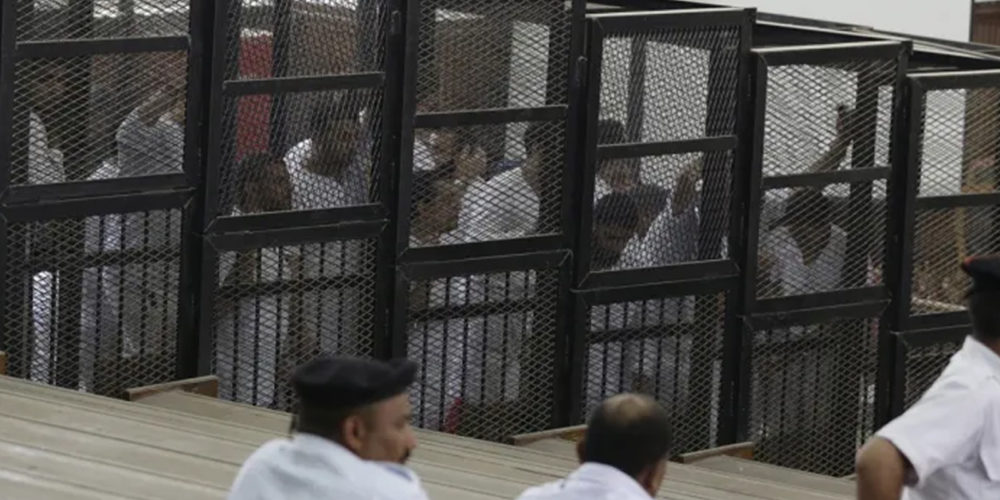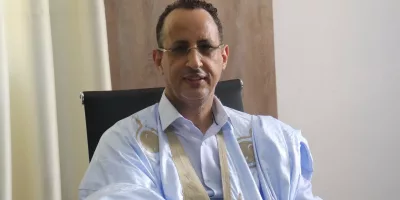The Committee for Justice (CFJ) said that the continued issuance of mass death sentences in cases of a political nature in Egypt is a natural result of the Egyptian courts’ failure to adhere to fair trial standards in cases of a political nature and subject them to the desire of the security services, and also as a result of the cessation of international and UN pressure on the Egyptian authorities to curb the relentless repression against all dissidents and human rights defenders from all political and ideological spectrums.
This comes after the issuance of the first circuit of the Egyptian Criminal Court of the first degree, heldat the Badr Courts Complex in Badr Prison, headed by Counselor Muhammad Al-Saeed Al-Sherbiny, and the membership of Counselors Essam Abu Al-Ela, Gharib Muhammad Metwally, Mahmoud Zeidan and Muhammad Nabil, in its session on Monday, February 19, 2024, The judge sentenced it to death two out of five defendants by hanging, 15 years in prison for two other defendants, and acquitted the fifth defendant, in Case No. 3257 of 2023 (Marg Felonies), known in the media as the “Hazmoun” case.
The names of the defendants sentenced to death were as follows:
– Mahmoud Ahmed Abdel Latif Mahmoud Al-Wazzan – Lecturer.
– Mustafa Ahmed Abdel Latif Mahmoud Al-Wazzan – Security Officer at “ANCO” Engineering Construction Company.
15 years’ rigorous imprisonment for:
– Abdel Karim Shehata Ali Galal – muezzin at the Cairo Awqaf Directorate with pension.
– Emad Abdel Karim Shehata Ali Galal – driver.
They were placed under police supervision for five years, after serving their sentences, and were obliged to pay criminal expenses.
It also acquitted the defendant – Mustafa Allouba Abdel Badi Hassan, a physical employee at the Customs Authority, of the charges against him.
The Public Prosecution accused the five defendants that on November 13, 2014, at the Department of Marg Police Station, Cairo Governorate, they joined a group established contrary to the provisions of the law with the purpose of calling for disrupting the provisions of the Constitution and laws, preventing state institutions and public authorities from carrying out their work, attacking the personal freedom of citizens, and harming national unity and social peace; “Hazmoun”, which calls for disrupting the provisions of the constitution and laws, preventing state institutions and public authorities from exercising their work by force, attacking members of the armed forces and police, their installations and public facilities, sabotaging public facilities, targeting opponents of the group’s ideas and orientations, and sabotaging their property and public property, with the aim of disturbing public order and endangering the safety and security of society.
Ahmed Mufarreh, Executive Director of CFJ, commented on the verdict: “The judicial authorities in Egypt are still determined to follow the executive authorities in targeting opponents and human rights defenders from various directions, as the death sentence is known, is only for the most serious crimes, here there are no deaths, and the events were related to a crisis political situation in the country, and the result is a death sentence in a trial that has nothing to do with fair trial standards.”
Several UN bodies also criticized the mass and politicized death sentences in Egypt, including a UN memorandum in September 2021, on mass death sentences in the case known in the media as the “Rabaa dispersal”, where the UN experts confirmed that the Egyptian courts did not meet the judicial procedures and the standards of legal procedures and fair trial, adding that “the sentences were not motivated enough”!
The experts also expressed concern about the escalation of executions in Egypt, making it the third largest executioner in the world, and that if confirmed, these facts will amount to a violation of the right to life, as the imposition of the death penalty and its execution, at the end of a trial in which all strict guarantees of due process and fair trial standards were not respected, constitutes arbitrary killing, which is prohibited under international law, stressing that when arbitrary executions are carried out on a large scale. In a systematic manner, this may amount to “crimes against humanity”; it may entail universal criminal responsibility for any official involved in such acts.
CFL condemns these mass and politicized death sentences and calls for their abolition and moratorium and for the defendants to be retried before a court that meets internationally recognized fair trial standards.
CFJ also calls on the Egyptian authorities to consider establishing an official moratorium on pending executions and future death sentences with a view to ensuring that death penalty cases are properly reviewed, as well as considering a moratorium on death sentences in general in compliance with UN and international treaties to which Egypt is a signatory.
CFJ reiterates its calls on UN mechanisms and the international community to pressure the authorities in Egypt to stop these sentences and to review terrorism laws to bring them into line with international and UN conventions and covenants to which Egypt is a signatory.






